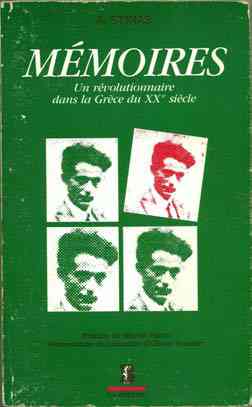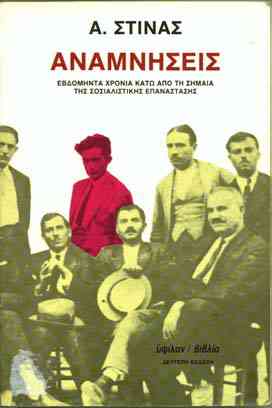antagonism
Aghis Stinas and Cornelius Castoriadis
Greek Communist Left and Socialisme ou Barbarie
Aghis Stinas was a member of Internationalist Communist Union, a small revolutionary
group in Greece during WW2. This group took an internationalist position,
opposing both belligerent blocks and the resistance movement, which was a
proxy of one of the Allied imperialist block.
This group also had as a member Cornelius Castoriadis, who was a founder
of the French group Socialisme ou Barbarie. We collect here writings
of Stinas, and articles about him and the tendency he was a part of. Also
links to articles by and about Castoriadis and Socialisme ou Barbarie.
"I would like to emphasize that the publication of S. ou B.
involved considerable collective labor from beginning to end. All the important
texts were discussed in advance by the group; the discussions often were
animated, sometimes very long and a few of them ended in scissions. I always
learned a lot in these discussions, and all the comrades of S. ou B. - those
whose names are found in the editorial synopsis of the review and those
who do not appear there - have played a part, in one way or another, in
making these texts better than they otherwise might have been. I must mention
in particular, however, the heroic figure of someone whom I still cannot
name and who made clear to me in circumstances where death was present every
day and at every street corner - and for him it almost never has ceased
to be so - what a revolutionary militant is, and what a politics is whose
thought recognizes no taboo. [I am speaking of A. Stinas, who has just published
in Greek the first volume of his Memoirs... ] "
Castoriadis 1979
Stinas’ Memoirs


Memoirs – Sixty
Years under the Flag of Socialist Revolution
The autobiography of Aghis Stinas is published in Greek and in French. We
present here for the first time a translation of about a third of the book.
We would welcome assistance in translating the rest of the book.
zipfile containing
PDF of v0.95 translation
Text on Stinas by Arturo Peregalli
Arturo Peregalli, "Contro venti e maree. La seconda guerra mondiale
e gli Internazionalisti del "Terzo Fronte". Grecia: Aghis Stinas
e l'Unione Comunista Internazionalista", Colibì, Paderno Dugnano,
2002
This is currently being translated from the Italian. Please contact us if
you would like to assist in translating this text.
Introduction
Chapter 1 - The Thirties
Articles by or about Stinas
Revolutionary History
- (Brititsh Trotskyists) have a number of other texts referring to Stinas
Stinas and Castoriadis
Socialisme ou Barbarie: A French Revolutionary Group (1949-65)
by Marcel van der Linden
“Socialisme ou Barbarie's most prominent intellectuals were Castoriadis
and Lefort. Cornelius Castoriadis was born in 1922 and studied law, economics
and philosophy at the University of Athens. Before the Second World War, during
the dictatorship of Metaxas, he had joined the Greek Communist youth organization.
However, when the Germans occupied the country and the Communist Party wanted
to ally itself with the bourgeois resistance, Castoriadis rejected the decision.
After a short period of political wanderings, he ended up with a small Trotskyist
group led by Agis Stinas. This was a risky choice, because Trotskyists were
threatened from two sides in Greece. The occupying power persecuted them whenever
possible and in 1943 executed the most important leaders, among them Pantelis
Pouliopoulos and Yannis Xypolytos. (4) When the country was 'liberated' in
1944, it was the Communists' turn. During massive 'mopping-up operations'
they murdered at least 600 of Trotsky's followers, often after having tortured
them. (5) This traumatic experience was a determining factor in Castoriadis'
further development. The Trotskyist view on Stalinism, which he had supported
only a short time before, seemed less and less correct.”
Available at the following links
Castoriadis and Socialisme ou Barbarie
What Really Matters
An article by Castoriadis from
Socialisme ou Barbarie. Asserts the
importance of workers' perspectives.
The Marxist Philosophy
of History
An article by Castoriadis from
Socialisme ou Barbarie. Explores how
the philosophical roots of Stalinism were present in Marxism and Leninism.
By P. Canjuers, Guy Debord Canjeurs is the pseudonymn of Daniel Blanchard,
and this text was written whilst he was a member of S ou B, but probably
prior to Debord’s membership of it.
Not Bored a Situationist
inspired zine and website with several articles dealing with Castoriadis
and S ou B
Art, Reification
and Class Consciousness in the Situationist International
By David Black in Hobgblin, a British Dunayevskayaite magazine.
Bordiga on Socialisme ou Barbarie
Doctrine of the Body Possessed by the
Devil – Bordiga, includes critical remarks on Socialisme ou Barbarie
“The problem is posed better in an interesting bulletin published by the
comrades of the “Groupe français de la gauche communiste internationale”
of which – with great pleasure - we do not know the names and personalities.
Sensible questions are asked on the problem which deserve further development,
and the problem is posed in contrast to the vision of the noted Chaulieu group,
which is influenced by the theory of “decadence” and of the transition from
capitalism to barbarism which inspires in them, however, the same horror
as that of the “bureaucratic” regimes. A theory in which one does not know
what on earth the compasses are indicating until they prattle about marxism.
There are elements in the internal bulletin of our movement on the decadence
of capitalism where we deal with the false theory of the descending curve.
Without any haughtiness scientifically speaking, it is only foolishness to
tell a story which reads: Oh capitalism, grab us, swindle us, reduce us to
a worn out old dog not worth a kick in the ribs, we will quickly recover –
all this just means that you are decaying. Just imagine that it is decaying...
As for barbarism, it
is the opposite of civilisation and so of bureaucracy. Our barbarian ancestors,
lucky them, did not have organisational apparatuses based (old Engels!) on
two elements – a defined ruling class and a defined territory. There was the
clan, the tribe, but still not the civitas. Civitas means city
and also state. Civilisation is the opposite of barbarism and means state
organisation, therefore necessarily bureaucracy. More state means more civilisation
means more bureaucracy, while class civilisations follow one upon the other.
This is what marxism says. It is not the return to barbarism, but the start
of supercivilisation, which is duping us everywhere, that the monsters
of contemporary state super-organisations dominate. But let us leave the members
of Socialisme ou barbarie to their existential crisis. The bulletin
we quoted refutes them in an article with the correct title: Deux ans de
bavardage: Two years of chattering – No chattering here, please note!”
Revolutionary Oppostion to World War Two
As well the International
Communist Union in Greece, there were small groups with a similar outlook
operating in several other countires. See the following
Third Camp Internationalists
in France During World War II by Pierre Lanneret
http://geocities.datacellar.net/CapitolHill/Lobby/2379/lannrt.htm
http://www.kurasje.org/arkiv/6300t.htm
Older versions
of both the above books are also published by the ICC without Bourrinet's
name.
Class
War on the Home Front - Pamphlet produced by the Wildcat group in the '80s.
It is concerned with the activities of the Anti-Parliamentary Communist Federation
in the UK (mostly Glasgow) during the Second World War. It contains numerous
articles from the APCF paper Solidarity.

